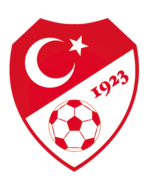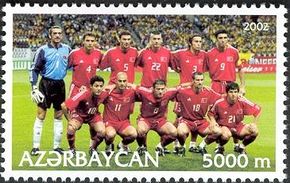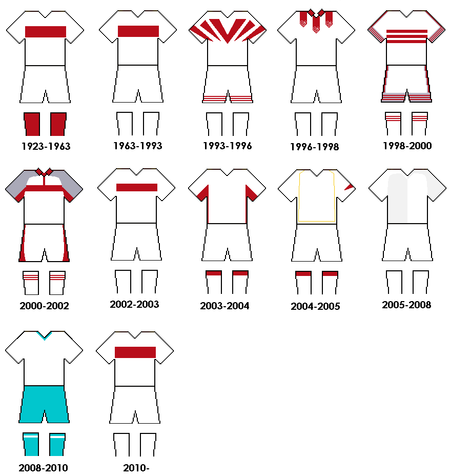Turkey national football team
 |
|||
| Nickname(s) | Ay Yıldızlar (The Crescent Stars) | ||
|---|---|---|---|
| Association | Turkish Football Federation | ||
| Confederation | UEFA (Europe) | ||
| Head coach | Guus Hiddink | ||
| Captain | Emre Belözoğlu | ||
| Most caps | Rüştü Reçber (120) | ||
| Top scorer | Hakan Şükür (51) | ||
| FIFA code | TUR | ||
| FIFA ranking | 28 | ||
| Highest FIFA ranking | 5 (June 2004) | ||
| Lowest FIFA ranking | 67 (October 1993) | ||
| Elo ranking | 19 | ||
| Highest Elo ranking | 9 (November 2002) | ||
| Lowest Elo ranking | 82 (November 1985) | ||
|
|||
| First international | |||
(Istanbul, Turkey; October 26, 1923)[1] |
|||
| Biggest win | |||
(Ankara, Turkey; November 20, 1949) (Geneva, Switzerland; 20 June 1954) (Istanbul, Turkey; 10 November 1996) |
|||
| Biggest defeat | |||
(Chorzów, Poland; April 24, 1968) (Istanbul, Turkey; 14 November 1984) (London, England; 14 October 1987) |
|||
| World Cup | |||
| Appearances | 2 (First in 1954) | ||
| Best result | Third place, 2002 | ||
| European Championship | |||
| Appearances | 3 (First in 1996) | ||
| Best result | Semi-finals, 2008 | ||
| Confederations Cup | |||
| Appearances | 1 (First in 2003) | ||
| Best result | Third place, 2003 | ||
The Turkish national football team is the national association football team of Turkey, controlled by the Turkish Football Federation (Turkish: Türkiye Futbol Federasyonu). They are affiliated with UEFA. The team is, according to the FIFA World Rankings, ranked 28th[2] in the world.
Turkey has a footballing tradition that features both highs and lows. In World Cup competition, Turkey has qualified three times for the 1950, 1954, and 2002 editions. Turkey, however, failed to make an appearance for the 1950 World Cup due to a withdrawal.
The team's highest achievement was reaching third place at the 2002 World Cup. Turkey also reached the knockout round of Euro 2000, the semi-finals of Euro 2008, and finished third in the 2003 Confederations Cup.
Contents |
History
The Turkish national team played their first ever match against Romania in 1923. Turkey qualified for the 1950 World Cup, beating Syria 7–0, but they had to withdraw due to financial problems. Turkey then qualified for the 1954 World Cup after a play-off with Spain. The Turkish team first lost 4–1 to Spain, but a 1–0 win a few days later initiated a replay. On that occasion, they tied 2–2 after, booking their place after a coin toss. Turkey was put in a group along with Hungary and West Germany. The Turks, however, never played Hungary due to the tournament format, and a 4–1 defeat by the Germans was followed by Turkey carrying out a 7–0 win over South Korea. Turkey lost the play-off to West Germany 7–2.
Despite the introduction of a national league, and showings by Turkish clubs in European competition, the 1960s would be a barren time for the national team. The 1970s saw Turkey holding back in the World Cup and European Championship qualifiers, but the team was a point too short to qualify for Euro 1972 and Euro 1976. The Turkish team also suffered their worst defeats with 8–0 scorelines against Poland and twice against England. Yet the 1990 World Cup qualifiers would mark a turning point for Turkish football, with Turkey only missing out on qualification in the final game.
Turkey qualified for Euro 1996, beating both Switzerland and Sweden 2–1 along the way. At Euro 1996, however, they lost all their matches without scoring a single goal. They did, however, go home with an award: the fair-play award, given to Alpay Özalan. Turkey qualified for Euro 2000 after winning a play-off against Ireland. Turkey lost their first match 2–1 to Italy, they drew their second match against Sweden 0–0, and beat host nation Belgium 2–0, making it the first time in the history of the European Championship that a host nation had been eliminated in the first round, brought Turkey into the last eight of the tournament where they were beaten 2–0 by Portugal.

Turkey finished second in their qualifying group, despite starting well and being the favourites to top the group. They lost 2–1 to Sweden in the crucial match that would decide the top spot. The Turks were forced to play the play-offs against Austria. They defeated the Austrians 6–0 on aggregate and booked their place at the finals. The Turkish team started the 2002 World Cup with a 2–1 defeat against eventual winners Brazil.[3] Turkey qualified from the group stage with a 3–0 win against China, after drawing 1–1 with Costa Rica.[4][5]
Turkey then faced home team Japan in the second round, beating them 1–0.[6] The Turkish team continued their run, as they beat Senegal 1–0 on a golden goal to book their place in the semi-finals where a 1–0 defeat against eventual tournament winners Brazil forced them to play the third place match, and a bronze medal was won after a 3–2 victory over a surprise South Korean team.[7][8][9] Hakan Şükür scored Turkey's first goal in 10.8 seconds, even when the South Koreans kicked off first. It was the fastest goal in World Cup history.[10] Tens of thousands of flag-waving Turkish fans greeted the World Cup squad on their return to Istanbul, were they joined a massive street party at Taksim Square.[11]
In the summer of 2003, Turkey reached third place at the 2003 Confederations Cup. In the group stages, they drew 2–2 against Brazil, eliminating them from the tournament. Turkey lost to eventual tournament winners France 3–2 in the semi-final match. Turkey then defeated Colombia 2–1 to win third place. The Turkish team failed to qualify for Euro 2004 on play-offs due to a loss to Latvia after finishing second in their group.
The Turkish team once again narrowly missed out on the finals after failing to win a play-off, this time on away goals against Switzerland, again after finishing second in their group. There were scenes of violence after the game on and off the pitch where the Turkish team brawled with Swiss players down the tunnel.
Turkey qualified for their first international tournament in six years by finishing second behind Greece in Group C. They were placed alongside Switzerland, Portugal, and the Czech Republic in Group A. In their first match, they played Portugal and were beaten 2–0, but wins over Switzerland (2–1) and Czech Republic (3–2) – both secured by late goals – brought qualification for the knockout stages.[12][13][14] Again, Turkey knocked out a host nation – Switzerland – in the group stages for the second time.[15]
The quarter-final against Croatia was goalless after 90 minutes, and Croatia led 1–0 in the final minute of extra time, but another late Turkish goal by forward Semih Şentürk brought the game to penalties. The goal raised some controversy with Croatia fans and Croatia's coach, Slaven Bilić, who claimed that the goal had been scored after extra time had elapsed. This complaint, however, was overruled, and the game went into penalties. Turkey beat out Croatia in penalties 3–1.[16]
They went into the semi-final against Germany with just 14 outfield players available as a result of injuries and suspensions, but scored first and were drawing 2–2 in the last minute of the match, until Germany scored a third goal in the last few seconds and Turkey was thus eliminated.[17]
Turkey had a mixed qualifying campaign, finishing with 15 points and missing out on a play-off place to Bosnia and Herzegovina with 19 points. Spain won Group 5 to qualify, winning every game in the process. Coach Fatih Terim announced he would be resigning his post following their failure to qualify.[18]
Turkey were drawn in Group A in qualification for UEFA Euro 2012, together with Kazakhstan, Austria, Belgium, Germany, and Azerbaijan.
Kit history

Recent results
Friendly matches 2010
| 22 May 2010 | Turkey |
2 – 1 | Red Bull Arena, Harrison | ||
| Arda Nihat |
(Report) | Černý |
| 26 May 2010 | Turkey |
2 – 0 | Veterans Stadium, New Britain | ||
| Yıldırım Şentürk |
(Report) |
| 29 May 2010 | United States |
2 – 1 | Lincoln Financial Field, Philadelphia | ||
| Altidore Dempsey |
(Report) | Turan |
| 11 August 2010 | Turkey |
2 – 0 | Istanbul, Turkey | ||
| Emre Arda |
Report | Stadium: Şükrü Saracoğlu Stadium Referee: Milorad Maziç (Serbia) |
Upcoming fixtures
Friendly matches
| 17 November 2010 | Netherlands |
v | Amsterdam | ||
UEFA Euro 2012 qualification – Group A
|
|
| 3 September 2010 | Kazakhstan |
0 – 3 | Astana Arena, Astana | ||
| 22:00 UTC+6 | Report | Arda Hamit Nihat |
Attendance: 25,000 Referee: István Vad (Hungary) |
| 7 September 2010 | Turkey |
3 - 2 | Şükrü Saracoğlu Stadium, Istanbul | ||
| 21:00 UTC+3 | Hamit Semih Arda |
Report | Van Buyten |
Attendance: 41,000 Referee: Damir Skomina (Slovenia) |
| 8 October 2010 | Germany |
v | Olympiastadion, Berlin | ||
| 20:45 UTC+2 |
| 12 October 2010 | Azerbaijan |
v | Tofik Bakhramov Stadium, Baku | ||
| 20:00 UTC+5 |
Coaching staff
| Manager | |
| Assistant manager | |
| Assistant manager | |
| Goalkepeer Coach | |
| Physiotherapist |
Squad
Current squad
The following players were picked for the UEFA Euro 2012 qualifying matches against the Kazakhstan and Belgium.[19] Hakan Arıkan was removed from the squad after physical tests revealed an injury in his left leg. He was replaced by club teammate Cenk Gönen.[20]
Caps and goals are correct as of 24 August 2010.
|
||||||||||||||||||||||||||||||||||||||||||||||||||||||||||||||||||||||||||||||||||||||||||||||||||||||||||||||||||||||||||||||||||||||||||||||||||||||||||||||||||||||||||||||||||||||||||||||||||||||||||||
Recent call-ups
The following players have also been called up to the Turkey squad within the last calender year (2010).
Previous squads
Competitive record
Honours
Player historyPlayers in bold are still active. Most capped players
Top goalscorersGoalscorers with an equal number of goals are ranked in chronological order of reaching the milestone.
Past managers
References
External links
|
||||||||||||||||||||||||||||||||||||||||||||||||||||||||||||||||||||||||||||||||||||||||||||||||||||||||||||||||||||||||||||||||||||||||||||||||||||||||||||||||||||||||||||||||||||||||||||||||||||||||||||||||||||||||||||||||||||||||||||||||||||||||||||||||||||||||||||||||||||||||||||||||||||||||||||||||||||||||||||||||||||||||||||||||||||||||||||||||||||||||||||||||||||||||||||||||||||||||||||||||||||||||||||||||||||||||||||||||||||||||||||||||||||||||||||||||||||||||||||||||||||||||||||||||||||||||||||||||||||||||||||||||||||||||||||||||||||||||||||||||||||||||||||||||||||||||||||||||||||||||||||||||||||||||||||
